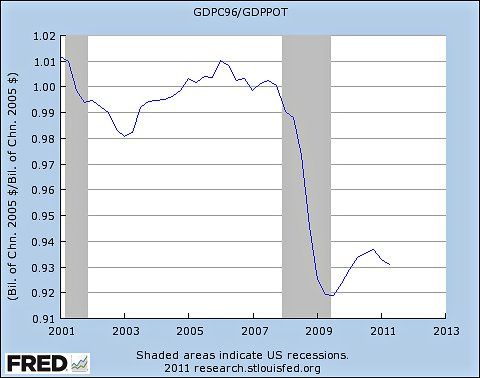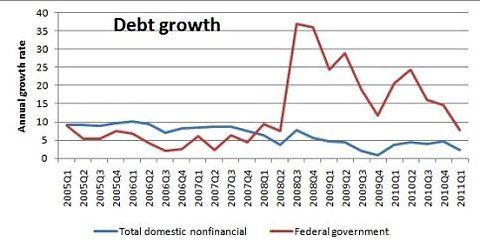The Obama administration has proposed a plan to refinance millions of mortgages that are held by Freddie Mac and Fannie Mae and would not require congressional action. The plan being to boost the housing market by helping “a broad swath of homeowners, stimulate the economy and cost next to nothing”:
One proposal would allow millions of homeowners with government-backed mortgages to refinance them at today’s lower interest rates, about 4 percent, according to two people briefed on the administration’s discussions who asked not to be identified because they were not allowed to talk about the information.
A wave of refinancing could be a strong stimulus to the economy, because it would lower consumers’ mortgage bills right away and allow them to spend elsewhere. But such a sweeping change could face opposition from the regulator who oversees Fannie Mae and Freddie Mac, and from investors in government-backed mortgage bonds.
Administration officials said on Wednesday that they were weighing a range of proposals, including changes to its previous refinancing programs to increase the number of homeowners taking part. They are also working on a home rental program that would try to shore up housing prices by preventing hundreds of thousands of foreclosed homes from flooding the market. That program is further along – the administration requested ideas for execution from the private sector earlier this month.
But refinancing could have far greater breadth, saving homeowners, by one estimate, $85 billion a year. Despite record low interest rates, many homeowners have been unable to refinance their loans either because they owe more than their houses are now worth or because their credit is tarnished.
There are some questions and stumbling blacks to implement the program. One major question is how this would apply to homeowners who are delinquent on their mortgage payments or in foreclosure.
But before there is even an answer for that, the real obstacle is getting the program approved by acting director of the Federal Housing and Finance Authority, Ed DeMarco, who oversees Freddie and Fannie. DeMarco is a holdover from the Bush administration and as Ezra Klein of the Washington Post points out may not be inclined to approve such an audacious program:
The Housing and Economic Recovery Act of 2008 put Fannie Mae and Freddie Mac under the control of the newly created Federal Housing and Finance Authority.
The FHFA is not like, say, the Treasury Department. It’s an independent agency, and right now it’s under the care of acting Director Edward DeMarco, a holdover from the Bush administration. Senate Republicans blocked the Obama administration’s nominee, Joe Smith, after he expressed some support for using Fannie Mae and Freddie Mac to heal the housing market. Any plan would either need to go through him or through Congress. And both DeMarco and the Republicans in Congress seem mostly interested in limiting Fannie and Freddie’s short-term losses so they can be spun off from the government.
Since DeMarco is only an acting director, he could easily be replaced by a recess appointment by President Obama. The problem there is that Mr. Obama, being disinclined to confront congress, will most likely not use the authority of his office to do so.
But speculate, as Klein does, if this were to pass, there are other issues:
The next big issue is known as “reps and warrants.” The short way of explaining this is that when the banks hand a loan over to Fannie and Freddie, they basically swear that the loan was properly constructed. If that later proves untrue, Fannie and Freddie can force the bank to buy it back.
David Dayen st FDL says that DeMarco has been good at forcing the banks tom refinance bad mortgages.
Klein continues with another hurdle, closing costs:
When you add up loan-level adjustment costs, title insurance, reappraisal, and all the rest of it, it’s often more than an underwater homeowner can bear. You can solve this problem the same way you can solve the rents and warrants problem – either make the banks eat the costs, in which case they may not participate, or get the government to eat the costs – but you’ve got to figure it out.
Dayen quotes Adam Levitin who doesn’t think that this will do anything for the homeowner who is in foreclosure or seriously delinquent:
So in the end, it’s really not clear who this would help. It ignores that there’s already been lots of refinancing at low rates since 2008-it’s not clear how much more refinancing some new initiative will possibly produce, much less how many foreclosures it will prevent. The refi idea seems to do nothing on either negative equity or unemployment. Any program that fails to address those just isn’t serious. I get that the administration has a MacGyver problem given that it can’t move anything in Congress, but that necessitates much more creativity, financially and legally, not rewarming old ideas. My prediction: this ends up accomplishing about as much as FHAShortRefi or Hope4Homeowners.
We need a TARP for Main Street. This isn’t it.
Somehow this is being touted as a stimulus for the economy but it doesn’t really put any extra cash in the hands of the homeowner. Nor does it address the underlying real problem that created this mess in the first place, unregulated bundling of mortgages though credit default swaps and derivatives along with fraudulent title searched and foreclosure fraud.



 With states and cities struggling to balance their budgets with lay offs of workers, cuts to benefits and wages, as well as, reduction of aid to schools, hospitals, clinics, and other agencies,
With states and cities struggling to balance their budgets with lay offs of workers, cuts to benefits and wages, as well as, reduction of aid to schools, hospitals, clinics, and other agencies, 

Recent Comments